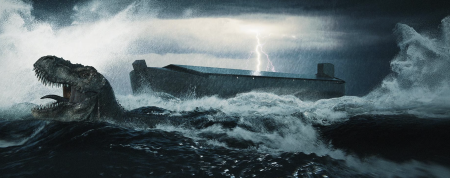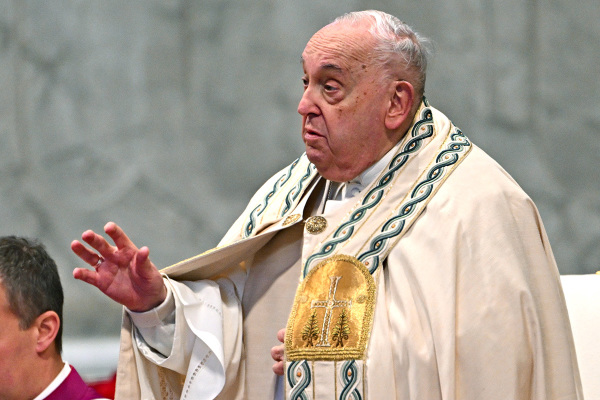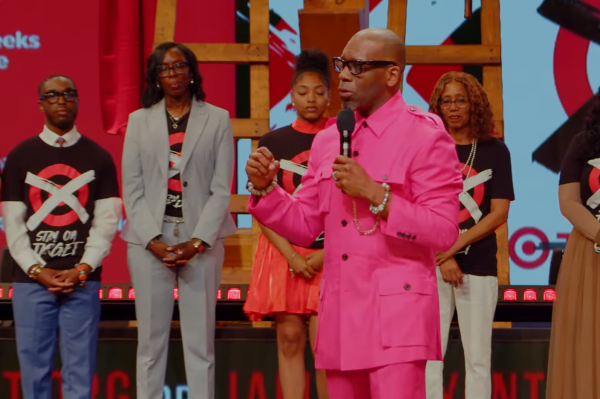'The Ark and the Darkness' challenges modern myths about Noah's flood, link to End Times

In an era when biblical narratives are often relegated to the realm of mythology, the "Ark and the Darkness" documentary seeks to reframe one of history's most debated tales: Noah's Flood.
"The evidence for the flood is really, really overwhelming," Dan Biddle, executive producer of "The Ark and The Darkness: Unearthing the Mysteries of Noah's Flood" and president of Genesis Apologetics, told The Christian Post.
"There are a lot of misconceptions about the flooding. And Hollywood not only doesn't represent the true biblical account, they add a lot of mythologies and a lot of themes that are just clearly not biblical. ... The two biggest misconceptions would be mythologizing the flood, saying it's an allegory, it didn't really happen. The other one that's actually within Christian circles is, 'It was just a local flood, God's judgment was only pertaining to the people living in Mesopotamia Valley.' … Our movie shows it wasn't an allegory; it happened in real-time just thousands of years ago, and it was a worldwide event."
"The Ark and the Darkness," from Sevenfold Films in collaboration with Genesis Apologetics, bridges the gap between various scientific disciplines — geology, paleontology, the study of fossils, ancient civilizations, volcanic activity and Earth sciences — all pointing unanimously to the reality of Noah's Flood.
The documentary features experts, including scientists from Answers in Genesis and Liberty University, like Dr. Andrew Snelling, paleontologist Dr. Gabriela Haynes and researcher and speaker Dr. Terry Mortenson, who uncover the factual basis of Noah's Flood.
The film hit theaters on Wednesday and Thursday.
Biddle pointed to a variety of scientific findings he said corroborate the biblical account, including the discovery of bioorganic materials in dinosaur bones, which suggests they were buried rapidly and relatively recently.
"There's no way that these tissues could have lasted for millions upon millions of years," he said.
The documentary, directed by Ralph Strean, explores the Morrison Formation, a geological site spanning 13 states in the middle of America, which contains a vast number of dinosaur fossils intermingled with marine life.
"How could you take a 13-state zone region and bury land creatures and marine creatures together over that much of an expanse?" Biddle asked. "The answer has to be a worldwide flood."
Beyond presenting physical evidence, "The Ark and the Darkness" also delves into the implications of Noah's Flood for understanding the state of the world today. Drawing parallels between the days of Noah and contemporary times, Biddle highlighted a perceived increase in lawlessness and moral decay, echoing biblical prophecies of the End Times.
"We just look around the world today, and it seems like a stage is being set for some interesting things," he said. "I'm not a doomsayer, I'm not a sensationalist, I'm not even really a prepper. But I would just say that most Christians nowadays can look around the landscape and say, 'Yeah, there's a lot of shift going on.' It's not a time to be fearful. It's a time to trust in the Lord, to run in our lanes, and to trust Him for both our short-term lives and what's going to happen in a longer play. Jesus Himself draws that parallel between the flood and End Times, and so we do the same thing in the movie."
The film counters evolutionary arguments, suggesting that Noah's Ark could indeed have housed representatives of all animal kinds necessary to repopulate the Earth post-flood. Biddle challenged the notion that the ark's capacity would have been insufficient, proposing that only around 7,000 animals were needed to account for the biodiversity seen today.
"One of the most popular allegations is … there's no way that Noah could have taken all of those different species on Earth today on the ark because there are millions and millions of species. … But that's one of the things that the Bible addresses straight out of Genesis and chapter one," he said.
"The experts at Answers in Genesis believe that you only need 7,000 animals total on the ark to reproduce all the different species and all the different breeds that we see today. So that would be one aspect of how we go against evolution theory in the movie," Biddle added.
Biddle also expressed concern over the growing trend among Christians to interpret the story of Noah's Flood as allegorical rather than historical.
"We hear a lot of people say they're just New Testament Christians," he said. "If that's true, please explain to me the Gospel without citing Genesis, and no one can do it."
Biddle stressed that understanding the Gospel's message of salvation is impossible without acknowledging the reality of sin introduced through Adam in the Garden of Eden. According to Biddle, denying the historical truth of events like Noah's Flood undermines the entire biblical narrative, including the teachings of Jesus and the writings of New Testament authors who referenced the flood as a factual event.
"It really cripples the Gospel message to say that either the garden or Adam or the flood was a myth," he said.
Biddle hopes viewers, regardless of their religious or scientific background, reconsider the historical validity of Noah's Flood.
"I think every person who watches this movie, from a hardened, licensed geologist who's a complete atheist all the way to a homeschool Christian who believes every word of Scripture, … will be shifted, shifted towards believing more about historic Christianity," he said. "It would be really hard to sit through an hour and 52 minutes worth of this avalanche of evidence and not come out believing, 'My gosh, I think they have a case.' And, we do."
For information and tickets for "The Ark and The Darkness," click here.
Leah M. Klett is a reporter for The Christian Post. She can be reached at: leah.klett@christianpost.com






















